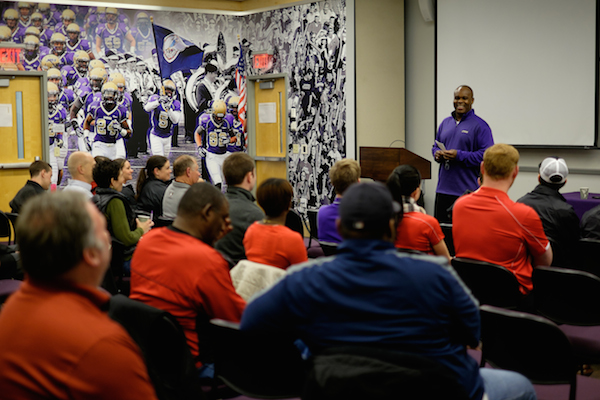Head games
News

Just as strength and conditioning can boost athletic performance, a strong mindset can give individual competitors and teams an edge, helping them overcome adversity and perform at their best when it matters most.
Since 2008, Dr. Bob Harmison and his staff at the Challace J. McMillin Center for Sport Psychology have been helping JMU student-athletes develop the mental side of the game, as well as assisting coaches and informing parents how to support their child’s pursuit of excellence.
Designated as a certified consultant by the Association for Applied Sport Psychology, Harmison’s background includes work with the 2002, 2006 and 2010 U.S. Olympic snowboarding teams, the Kansas City Royals minor league organization and four Division I universities. His principal area of interest is mental toughness, which he says is a combination of confidence, motivation, focus and managing anxiety.
“For the serious athlete, at some point physical skills level out,” Harmison said. “Those individuals who can focus when they need to, who stay confident even when they’re not being successful, who are intrinsically motivated and persist through difficulties, are the ones who tend to separate themselves.”
In any given year, Harmison and his crew counsel about half a dozen JMU teams. “Each team is different, but I talk a lot about optimism and hope, which become really important when things aren’t going very well,” he said. “Those factors, in turn, have an effect on things like effort and persistence, which we know lead to success.”
The McMillin Center is also involved in community outreach efforts, serving as a resource for local college, high school and youth sports teams, and educating coaches on how best to create a positive psychological environment around kids and athletes so they can excel.
At the center’s 2015 coaching clinic last month, graduate assistant director Chad Doerr, a student in JMU’s Combined-Integrated Doctoral program in Clinical-School Psychology, emphasized that sport can be a vehicle for positive change only if coaches and parents make it a priority.
“Some of the best experiences I’ve had have been through sports,” said Doerr, who overcame an arm injury in high school to play collegiate baseball before earning a master’s degree in sport psychology. “Everyone should be allowed to have positive experiences with sport, but that doesn’t always happen. Coaches and parents need to find those teachable moments and help kids generalize that this situation you’re in, this experience you are having, will benefit you in the long run with other things you will encounter in life. I think that’s really the spirit of what we do at the McMillin Center.”
“The most helpful thing for me was learning the do's and don’ts as a coach to help instillconfidenceand mental toughness in my players." — Chad Edwards, Spotswood High School boys basketball coach
The clinic, “Head, Shoulders, Knees and Toes: Coaching the Whole Athlete,” featured presentations from JMU head football coach Everett Withers; Christy Morgan, head coach of the Dukes field hockey team; and McMillin Center staff members Dr. Sarah Carson Sackett and Dr. Greg Young.
Chad Edwards, head coach of the Spotswood High School varsity boys basketball team, had the opportunity to work with the McMillin Center a few years ago. “The most helpful thing for me was learning the do's and don’ts as a coach to help instillconfidence and mental toughness in my players,” Edwards said. “Our team had experienced a tremendous amount of adversity with lots of injuries, dealing with high expectations, and enduring a very slow start to the season. I am convinced our team would not have been able to overcome everything without the help of Dr. Harmison and his students.”
The McMillin Center was established with a gift from JMU alumni Joe Showker (’79) and his wife Debbie (’78). The couple’s passions include leadership development, education and psychology. The center is named for longtime coach, mentor and kinesiology instructor Dr. Challace McMillin, who started the cross-country, track and field, and football programs at Madison in 1971-72, and has been providing sport psychology services to JMU athletes and teams since 1990.
###
Jim Heffernan (’96)

